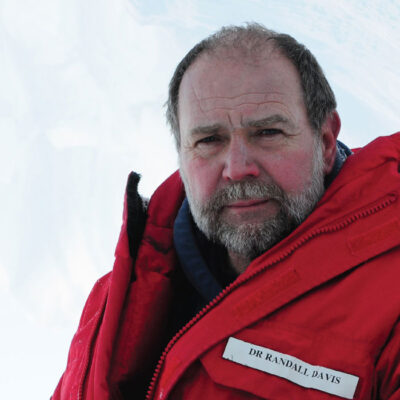Contact
Biography
Randall William Davis is an educator and researcher who studies the physiology and behavioral ecology of marine mammals and other aquatic vertebrates. His physiological research focuses on adaptations of marine mammals for deep, prolonged diving. Davis has continually emphasized the importance of studying aquatic animals in their natural environment and has spent many years developing animal-borne instruments that record video and monitor three-dimensional movements, swimming performance and environmental variables to better understand their behavior and ecology. Davis participated in the first deployments of mechanical and microprocessor time-depth recorders (TDRs) on pinnipeds and penguins in the mid-to-late 1970s. The 1980s saw the advent of more sophisticated microprocessor-based archival and satellite-monitored tags and, by 1986, thousands of dives had been recorded on many species of marine mammals, penguins and reptiles. However, time-depth profiles did not provide information on what the animals were doing at depth, so any behavioral interpretations were speculative. This led Davis to partner with an electronics engineer (William Hagey) to begin developing instruments that would eventually record video as well as depth, swim speed, magnetic bearing, pitch and roll, flipper/fluke stroking, GPS location at the surface and environmental variables such as conductivity (salinity), temperature and dissolved oxygen. Davis and his graduate students have spent over four decades studying the morphological, physiological and metabolic adaptations of marine mammals for deep, prolonged diving. Davis' research has shown that the dive response (a fundamental adaptation for breath-hold diving) is more complex than earlier recognized. Although the dive response is a primitive cardiovascular response to protect animals from asphyxia, Davis showed that it has been integrated with the equally primitive exercise (fight-or-flight) response to regulate blood flow in a manner that maintains aerobic metabolism at different levels of submerged exercise. A third area of Davis’ research has focused on the thermoregulatory physiology of sea otters and the harmful effects of oil exposure. Davis is a Regents Professor of marine biology at Texas A&M University at Galveston and a Regents Professor of wildlife and fisheries sciences in the College of Agriculture and Life Sciences at Texas A&M in College Station. He earned a BS in biology, with high honors, from the University of California, Riverside, and a PhD in physiology from the University of California, San Diego.
